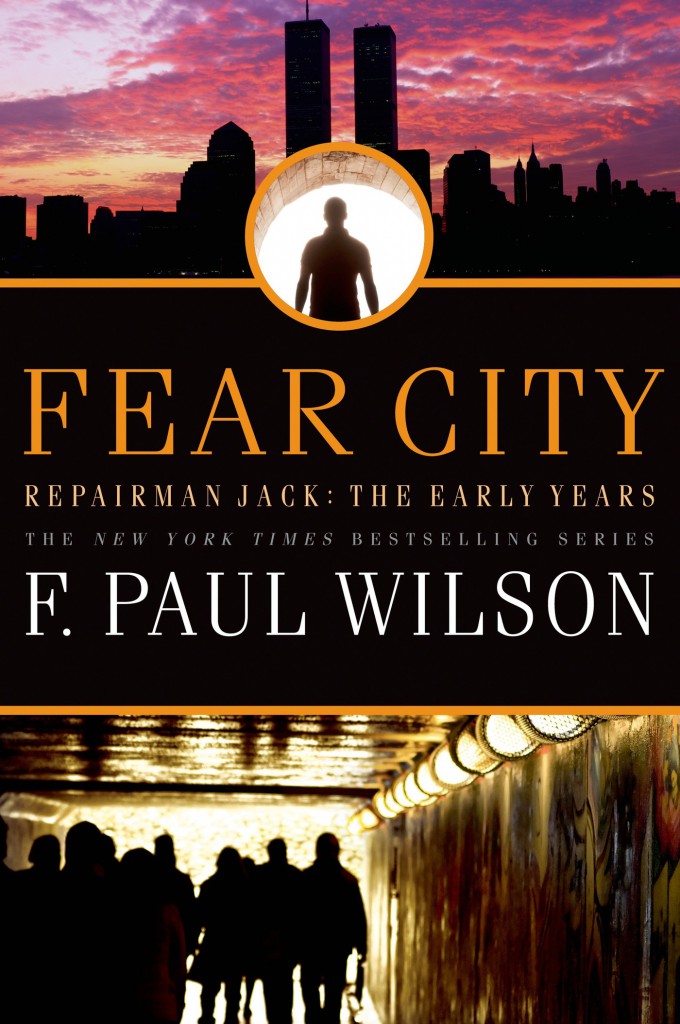Welcome to this week’s installment of The Scariest Part, a recurring feature in which authors, comic book writers, filmmakers, and game creators tell us what scares them in their latest works of horror, dark fantasy, dark science fiction, and suspense. (If you’d like to be featured on The Scariest Part, please review the guidelines here.)
I’m especially happy to have New York Times bestselling author F. Paul Wilson as my guest because I’ve known Paul for nearly fifteen years now and am delighted to call him a friend. He also happens to be one of those most talented, prolific, and accomplished authors I know. His latest novel, Fear City, features one of his most popular and enduring characters, Repairman Jack, in the final novel of the Repairman Jack: The Early Years trilogy. Here is the publisher’s description:
Rage, terror, and redemption: these are the stones upon which F. Paul Wilson builds the concluding chapter of Repairman Jack: The Early Years, the prequel trilogy focusing on the formative years of Wilson’s globally popular supernatural troubleshooter.
The strands of Jack’s life, established in the first two books, Cold City and Dark City, are now woven into a complete pattern.
Centered around an obscure group of malcontents intent on creating a terrible explosion in New York City in 1993, Fear City shows the final stages of young Jack becoming Repairman Jack. It is a dark and terrible story, full of plots and needless mayhem, with secret agents, a freelance torturer, a secret society as old as human history, love, death, and a very bleak triumph. Jack threads his way through this intricate maze, as people he loves are stripped away from him in a way that presages the later epic series of novels.
And now, let’s hear what the scariest part was for F. Paul Wilson:
When the copyedited manuscript of Fear City arrived from the publisher six moths ago, I set about fine-combing the text. My copyeditor for the last dozen-plus years, Rebecca Maines, had done her usual excellent job of flagging inconsistencies and typos and the occasional verbless sentence. I always take extra time at this stage because it’s my last chance to sharpen dialog, hone descriptions, and make cuts before the book is typeset.
Things went smoothly until I came to Dr. Moreau.
Yeah, Dr. Moreau. I couldn’t resist naming a torturer known to all the clandestine services and organizations as La Chirurgienne after H.G. Wells’s vivisectionist. It seemed…right.
You have to realize it had been months since I’d sent off the manuscript and she’d kind of faded from my consciousness. But as I reread her passages, I kept thinking, What dark corner of my hindbrain did I plumb to find this woman?
The clichéd template of the torturer is Szell from Marathon Man. Adèle Moreau, on the other hand, is a cultured, rather brittle French woman with a thick accent. She was trained as a surgeon but developed a sideline of hiring out to extract information from people who don’t wish to part with it. She doesn’t think of herself as a torturer or a sadist, but rather a pain researcher — a “nociresearcher,” to use her term — and sees her interrogations as opportunities for scientific research.
She maintains a certain decorum about her work — e.g., she likes her subjects fully clothed.
“I find proximity to a naked human, how shall we say, distasteful. I can cut away to expose whatever area I wish to explore.”
That “explore” got me — and it came from me. Her specialty is the delicate, minimally invasive procedure.
“I abhor brutality—the fists, the truncheons, the waterboarding. And the mutilation of genitalia — dégoûtant! So crude. So unnecessary.”
Charlot, her pet Yorkie, stays in her procedure room when she operates and she occasionally feed him scraps.
What I found most disquieting on the reread was that I had no memory of sitting down and designing this lady from hell. Perhaps I’ve been turning stereotypes on their heads so long it simply came naturally. If the cliché is an ex-Nazi or an Albanian thug, I’ll use a genteel professional — a female instead of a male — and give her a French accent, evoking the culture that gave us the Impressionists. Think Monet’s lilies…floating on blood.
Maybe that’s all it was…unconscious habit. I took comfort in that.
But then I came to her specialty, known as “IV,” and all comfort vanished. “IV” stands for “Infernum Viventes,” Latin for “Living Hell.” It is, I would say, the nastiest, most diabolically evil thing you can do to a human being. I have no idea where IV came from. Perhaps it exists somewhere in fiction or real life, but I’ve never seen or heard of anything like it. So I’ve got nothing to blame for it except my own id. And that’s scary.
The key word is “Living.” Because in our society, we would not let someone die after they have suffered this procedure. We will keep them alive for as long as modern medical science allows. Prolonging life…it’s what we do.
But if you’re the victim, the only thing you’d request — plead for if you could communicate — is death.
What is IV? Well, that would be a spoiler. And I don’t want to spoil one of Fear City’s centerpieces for you.
F. Paul Wilson: Website / Facebook / Twitter
Fear City: Amazon / Barnes & Noble / Powell’s / IndieBound
F. Paul Wilson, the New York Times bestselling author of the Repairman Jack novels, lives in Wall, New Jersey. In 2008, he won the Bram Stoker Award for Lifetime Achievement.



Leave a Reply